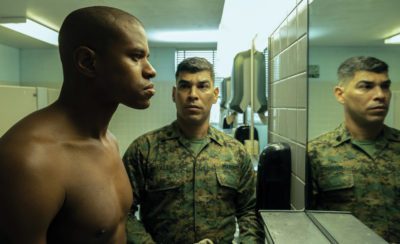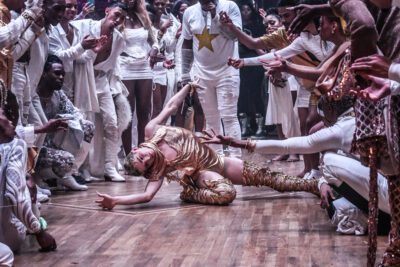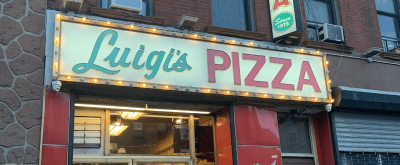Photo by Sandy Morris/HBO
‘Somebody Somewhere’ is actually a little bit everyone everywhere
The Brooklyn-based creators of the quietly lovely HBO hit discuss making the show and working with stars Bridget Everett and Jeff Hiller
Is it possible to tell a story about musical theater-loving misfits in a new way? Surprisingly, yes.
“Somebody Somewhere” is an HBO dramedy starring New York cabaret performer Bridget Everett as Sam, a loner and singer who’s too damaged to sing. She moves home to Manhattan, Kansas (Everett’s real hometown) after her sister dies unexpectedly. When her co-worker Joel (Jeff Hiller) invites her to something called Choir Practice, she’s shocked to find a chosen family, in her hometown, no less.
Choir Practice is a gathering for people on the outskirts of red state America — and they meet inside a dying mall at an old GAP. The group is basically hidden in plain sight. They help Sam reawaken to herself and see her hometown with new eyes, but, not like in a culty way.
Hannah Bos and Paul Thureen created “Somebody Somewhere” for Everett based on what her life would have been like if she never left home. They traveled with her to Kansas to infuse the show with real stories from queer people and other community outsiders.
“We found out they don’t have a gay bar, but there’s gay night at some venues. It reminded us of our high school theater days where you find your people and make something,” says Thureen. “If you don’t see a place for yourself, you make the place for yourself.”
In 2004, Thureen, Bos, and friend Oliver Butler created The Debate Society in Brooklyn as a purposefully small theater. Over the years, they’ve grown into an Obie Award-winning company, but they still strive to tell unique outsider stories. It sounds a little like Choir Practice.
“Somebody Somewhere” returns on Sunday, and the writing partners spoke with Brooklyn Magazine during the writing process for season two.
https://www.youtube.com/watch?v=uIezlm0iTFA
How did the show originate?
Paul Thureen: Carolyn Strauss was working with Bridget Everett to develop a show for her at HBO, I think because Hannah and I are from the Midwest, we came up and Carolyn’s mind. They came to us and asked what we would pitch for Bridget? We knew Bridget is from Manhattan, Kansas. We thought, “What if somebody like Bridget, with her talents, personality, and her dreams didn’t leave her hometown? How would that work and how would she find her community?” We were interested in the gray areas where people like her and Joel [played by Jeff Hiller] live in red states. People look at them with a black and white lens but all kinds of people live there.
Hannah Bos: We shot the pilot in the fall of 2019, and in 2020, we were supposed to shoot in L.A., but then everyone entered lockdown so we ended up pushing our shoot. It gave us a lot more time to develop the show and look back on life in a positive way. It gave us inspiration for Bridget’s character not to give up on life because we learned the most important theme to Bridget is that dreams don’t have deadlines.
Sam, Bridget’s character, and Joel meet at work but their friendship develops at Choir Practice, this group that’s part church, part cabaret act. You wade into murky waters at the intersection of gay people and the church.
Thureen: The idea of looking with a real and compassionate lens at gay people of faith and artists in the Midwest was the very starting point of this show. Of Bridget in Kansas with this community of outsiders who are connected to faith.
Is Sam and Joel’s friendship based on your creative partnership?
Thureen: We don’t like each other. [Laughs.] No, that was a big thing for us, we love the idea that the central love story of this show is a friendship between Sam and Joel. I don’t know if Sam and Joel feel like us, but the importance of your chosen family and friendships is a big love letter written into the show.
Talk about building Jeff’s character Joel, a gay Christian in the middle of Manhattan, Kansas. I don’t ask that assuming it’s uncommon — I think it’s more common than anyone knows, and that’s why Joel is such an incredible character to meet.
Bos: Coming from the Midwest, it feels like these are people we know. We dialed in as specific as we could to make it not look like these people are an anomaly, that these people exist. So we just drew on people we knew from our hometowns. These roles are coming from a place of truth. There are people like this everywhere. I just don’t know how much we highlight them.
Thureen: My mom is from a family of 11 brothers and sisters and was raised in a fundamentalist Christian family. I have like 36 first cousins on my mom’s side, who are all across the political spectrum. But most of them are part of a faith community so I saw this world firsthand. My parents live in Minneapolis and go to a progressive church. I have a female friend from high school, who is a pastor, and she emailed me saying, “Thank you so much for having a female pastor whose first line is about having a margarita.”
In the first season, Joel secretly uses the church he attends for Choir Practice. Instead of giving Pastor Deb a chance to say anything when he’s found out, he gives her the keys and walks out. Why didn’t he give her an opportunity to say anything?
Bos: I think he was ashamed that he lied to her. I feel like he was so disappointed in what that means to lie to this person he cared for. It’s connected to his values and religious views.
Thureen: In this show and other things we write, we often like writing about things that happen before or after the main event that’s usually focused on. I imagine that he probably had a conversation with Pastor Deb and just from the little things we know about her, I’m pretty sure she was understanding. He could have stayed, but I think we didn’t show that conversation for a reason. Even if she tried to convince Joel to stay he didn’t feel worthy of that. That’s a theme in the show of worthiness and self worth and feeling like you belong. This was a crisis point of Joel not feeling worthy of being in this place.
Learning to forgive and be forgiven is really tough for most of us.
Thureen: Something we talk about in the writers room a lot is sometimes people don’t have experience talking about their feelings or self awareness. I think Joel probably does more than a lot of characters. But sometimes we deal with these moments of crisis and dealing with challenges in your family or your faith without the words to articulate it.
In the last episode of season one, everything comes full circle for Joel. He’s having fun with friends in a purple party bus and says, “This is church.”
Thureen: Character growth is important, but we like keeping it a little slow in this show. Then Jeff improvised the church line in that moment, and it’s such a perfect line that we took that as we thought about the second season and what is church for him. It really is a testament to the actors that when they were improvising it wasn’t to out-joke each other. It was always within the world and mentality of the character. It was such a perfect button on his journey for the season.
You might also like 


























